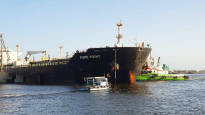Asset management giant Amundi predicts that next year the Russian economy will grow clearly faster than the economy of the euro area.
Europe’s largest asset management company Amundi predicts that the Russian economy will grow three times faster than the euro area next year, reports news agency Reuters.
Amundi’s investment manager by Vincent Mortier According to Russia, the gross national product is expected to grow by 1.5 percent in 2024 and two percent in 2025. For the Eurozone, the corresponding figures are 0.5 and 1.2 percent.
– This means that the United States, Europe, Japan, Australia and other developed countries are not able to sanction Russia effectively. It’s sad, but true, Mortier told Amundi’s press conference.
According to Mortieri, the sanctions work when it comes to freezing the assets of certain individuals – but they don’t affect imports and exports that much.
Mortier estimates that, for example, the Bricks countries, Turkey and Kazakhstan have benefited from the sanctions, when Russia has been looking for new destinations for its exports.
News agency Bloomberg estimated last week that the most important sectors of the Russian economy have adapted to the sanctions and partially even recovered from the sanctions resulting from the war.
Good price for oil
The $60 price ceiling set by Western countries for Russian oil trade has been managed to be circumvented almost completely, Western officials estimate the economic newspaper of The Financial Times (FT) according to According to FT, this forces Western countries to think about ways to tighten economic sanctions against Russia.
– Recent data shows that we need to step up our actions, an anonymous European government official told FT last week.
Russian export statistics also signal that the effect of the price ceiling has been diluted. According to Russia, the October oil trade statistics show that the average price it received for its oil was more than 80 dollars per barrel. The FT points out that Russia’s economic statistics have been questioned during the war, but Russia uses these figures as the basis for its taxation.
